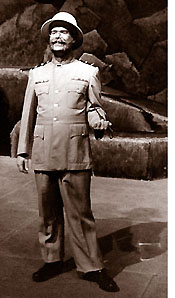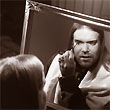
Spring 1999
![]()
Soundings is a publication of the School of Humanities and Social Science at MIT
Comments and questions to www-shss@mit.edu
Hidden gems: artist behind the desk
Prankish penchants
 Beneath
Andrew Sweet's demeanor of apparent self-restraint lies a penchant for
the zany and madcap. The predilection gets expressed flagrantly"—and
publicly"—in Sweet's lifelong enthrallment with Gilbert & Sullivan.
From the age of five, when he saw his first G&S operetta on a New
York City stage, Sweet was hooked. Since then, the 35-year-old administrative
assistant in the Foreign Languages and Literatures Section has been involved
in more than a dozen G&S operettas. In the last several years, he
has focused his talents on MIT's Gilbert & Sullivan Players (MITG&SP),
performing the comic lead in The Pirates of Penzance, stage directing
it, as well as Patience and The Mikado, and publicity-managing
Ruddigore. His most recent Savoyard fling was with MITG&SP in
mid-April, 1999, where he showcased his bass bravura in the vocally challenging
supporting role of Sergeant Meryll in The Yeomen of the Guard.
Beneath
Andrew Sweet's demeanor of apparent self-restraint lies a penchant for
the zany and madcap. The predilection gets expressed flagrantly"—and
publicly"—in Sweet's lifelong enthrallment with Gilbert & Sullivan.
From the age of five, when he saw his first G&S operetta on a New
York City stage, Sweet was hooked. Since then, the 35-year-old administrative
assistant in the Foreign Languages and Literatures Section has been involved
in more than a dozen G&S operettas. In the last several years, he
has focused his talents on MIT's Gilbert & Sullivan Players (MITG&SP),
performing the comic lead in The Pirates of Penzance, stage directing
it, as well as Patience and The Mikado, and publicity-managing
Ruddigore. His most recent Savoyard fling was with MITG&SP in
mid-April, 1999, where he showcased his bass bravura in the vocally challenging
supporting role of Sergeant Meryll in The Yeomen of the Guard.
Elaborating on what draws him to G&S, Sweet points first to the music, which is "sublime in many instances. The melodies are catchy, uplifting, and some can bring me to tears, even after all these years. But I'm also impressed with the stagecraft and, of course, the words. Gilbert's abilities with meter, rhyme and word combinations are phenomenal."
 The
bright lights are also a draw. "Being in front of an audience"—giving
pleasure to a crowd"—is a great thrill. I love soaking up the applause
and getting the laughs," he says, adding that he also relishes directing:
"I like being the commander-in-chief who has final say over artistic
decisions."
The
bright lights are also a draw. "Being in front of an audience"—giving
pleasure to a crowd"—is a great thrill. I love soaking up the applause
and getting the laughs," he says, adding that he also relishes directing:
"I like being the commander-in-chief who has final say over artistic
decisions."
With his dramatic preferences leaning to the comedic, Sweet's favorite roles include The Mikado's Ko-Ko because he's "so over-the top" and Hildebrand in Princess Ida because it allows him to showcase his fast patter-song skills. In Pirates of Penzance, in which he played Major-General Stanley, Sweet encored the famous "I Am the Very Model of a Modern Major-General" in double time. "I wanted to get to the point where I was likely to stumble."
 In
the fall of 1997, Sweet moved beyond the 19th-century to direct the world
premiere of Robots, a sci-fi musical love story between a robot
and a satellite, performed by the MIT Musical Theater Guild. "Though I'm
not much of a fan of the 20th-century musical, the sci-fi setting struck
me as funny," says Sweet, who is no stranger to science fiction. Since
he was 12, he has been "hammering away" at a series of sci-fi novels;
to date, he has written more than a million words of background material"—creating
an entire future universe. "It's a story about how humanity, roaming unfettered
across several galaxies, changes over the course of a millennia as a result
of meeting another species, which manipulates matter at the atomic level
and performs all kinds of mischief, like altering our DNA at will. Friendly
is a concept outside their experience."
In
the fall of 1997, Sweet moved beyond the 19th-century to direct the world
premiere of Robots, a sci-fi musical love story between a robot
and a satellite, performed by the MIT Musical Theater Guild. "Though I'm
not much of a fan of the 20th-century musical, the sci-fi setting struck
me as funny," says Sweet, who is no stranger to science fiction. Since
he was 12, he has been "hammering away" at a series of sci-fi novels;
to date, he has written more than a million words of background material"—creating
an entire future universe. "It's a story about how humanity, roaming unfettered
across several galaxies, changes over the course of a millennia as a result
of meeting another species, which manipulates matter at the atomic level
and performs all kinds of mischief, like altering our DNA at will. Friendly
is a concept outside their experience."
While the G&S canon features a smattering of fantastical elements, the only apparent similarity between the 19th-century operettas and the sci-fi mindbends is the undertow of mix-up and disorder"—boisterously madcap in one, more freakish in the other. In both cases, Sweet is making good indulging his prankish predilections.
Artistic flair often resides in unexpected places. In our Artists Behind the Desk series, we profile the unsung artistry - visual arts, dance, music, theater, and poetry - found amidst the 400 faculty and staff of the School of Humanities and Social Science.